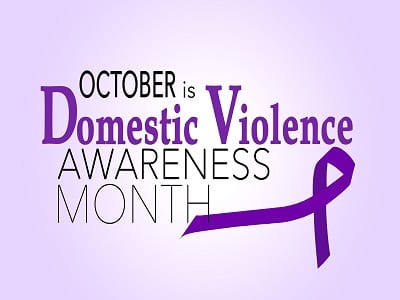In 1981, the National Coalition Against Domestic Violence (NCADV) created a Day of Unity, designed to increase awareness of domestic violence. The movement to expand awareness grew, and in 1987 became a month-long observance. In 1989, Congress formally declared October as Domestic Violence Awareness Month.
Events during October seek to raise awareness of domestic violence, provide resources for victims, encourage everyone to watch for signs of domestic violence, and to take action if they suspect domestic violence.
Domestic Violence Statistics
Domestic violence happens to both women and men across all social classes, religions, races, sexual orientations, and cultures.
Defined by the U.S. Department of Justice Office on Violence Against Women as “a pattern of abusive behavior in any relationship that is used by one partner to gain or maintain control over another intimate partner,” domestic violence can be physical, sexual, emotional, economic or psychological.
The NCADV provides a comprehensive National Statistics Domestic Violence Fact Sheet, which includes the following data:
- More than 10 million women and men are physically abused by an intimate partner each year in the U.S.
- 19% of domestic violence involves a weapon. The presence of a gun in a domestic violence situation increases the risk of homicide by 500%.
- 72% of all murder-suicides involve an intimate partner; 94% of these victims are female.
- 1 in 15 children are exposed to intimate partner violence each year, and 90% of these children are eyewitnesses to this violence.
How You Can Raise Awareness
All of us can help support Domestic Violence Awareness Month by facilitating or attending educational events, community gatherings, and support groups.
- Learn how to spot the signs of domestic violence.
- Speak up if you fear someone is being abused. Offer to help.
- Gather and share resources.
- Post on social media to educate others about domestic violence.
- Host a community or private educational or fundraising event.
Use the NCADV fact sheet noted above and the 20 Facts for Violence Awareness Month fact sheet to educate yourself about domestic violence, then work to educate others.
No More Foundation
The No More Foundation, a coalition of nonprofits, corporations, government agencies, schools, and other groups committed to ending domestic violence and sexual assault, warns the COVID-19 health crisis has caused a significant increase in incidents of domestic violence. If you are suffering abuse, or know someone who is, call 911 or the National Domestic Violence Hotline at 1-800-799-7233.
Access the No More website for a variety of resources you can use to spread awareness about domestic violence. Information is available in English and Spanish.
- #LISTENINGFROMHOME – view and share public service announcements & graphics
- #1THING – join the social media campaign entitled, “No survivor justice without racial justice”
- #NOMOREDVAMSIGN – take and share a picture of yourself with No More sign
The Department of Defense offers a Domestic Violence Awareness Month 2020 Messaging and Resource Guide for the military community.
Visit the National Domestic Abuse Hotline website to learn how to recognize abuse, how to get help for yourself or another, to read informative articles, and to learn how you can help end domestic violence.
Turning Point of Tampa has been offering Licensed Residential Treatment for Addiction, Eating Disorders and Dual Diagnosis in Tampa since 1987.



